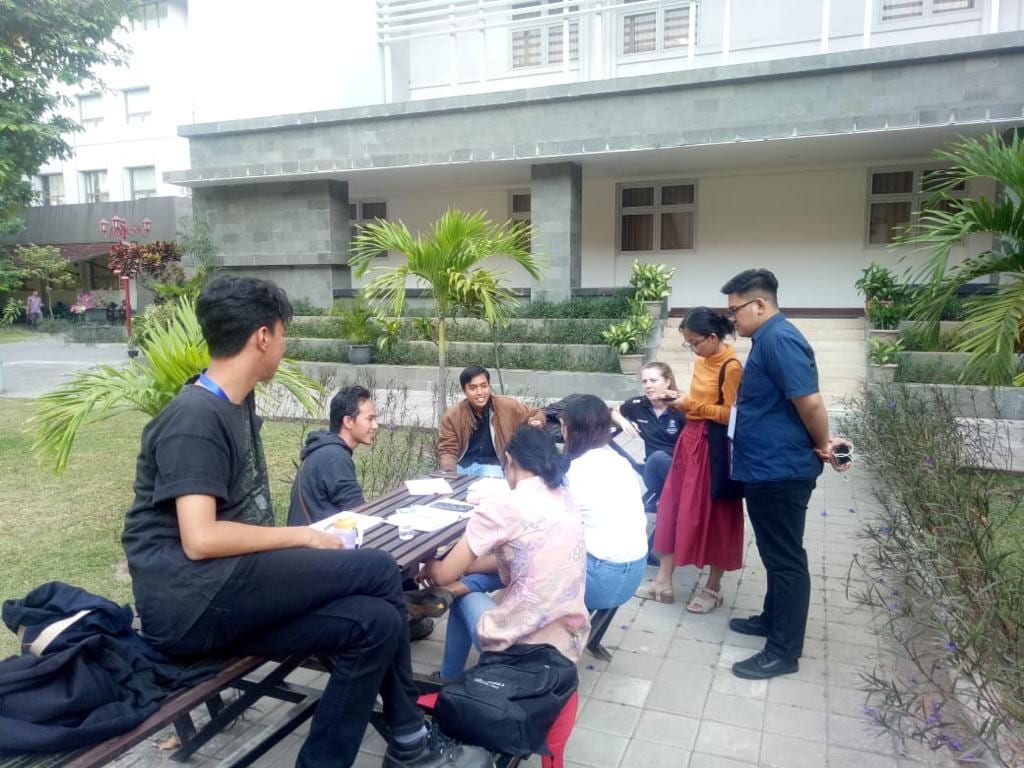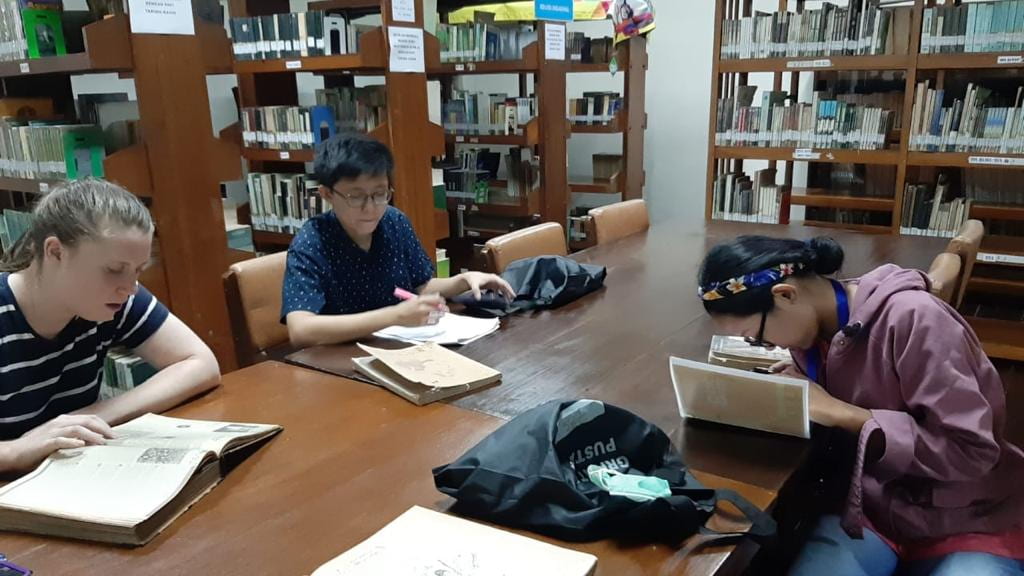
Becoming a Transnational Scholar of Southeast Asia
In 2019, Caitlin Ryan (Masters of International Relations) and Hillary Mansour (Combined Honours in History and Indonesian Studies), and Michael Anderson (Honours in History) spent a week at Gadjah Mada University (UGM) in Yogyakarta, Indonesia, together with students and academics from universities across Asia, Europe and the Middle East. In this article, they tell us about the experience of the Summer School and how it has influenced their work.
The theme of the Summer School was Becoming a Transnational Scholar of Southeast Asia and, although History was its principal focus, we were also treated to contributions grounded in Political Science, Sociology and Geography. The transnational approach to History is based on the view that by confining themselves to the study of a particular nation-state, scholars have not always adequately attended to regional and global trends or connections. Although the idea of transnationalism has been around for some time, its application to the realm of Southeast Asian History is fairly recent, perhaps especially so in the Southeast Asian countries themselves, where the priorities of postcolonial nation-building have had a strong influence on the shape of scholarship. Learning about how Southeast Asian history might be written from a transnational perspective was therefore a very stimulating experience.
Prior to commencing the Summer School we had each spent some time in Indonesia, and Hillary and Michael both wrote Honours theses looking at Indonesian history. As Indonesianists we have tended to ‘peer in’ at the country, focusing on its peculiar local dynamic, so it was particularly engaging for us to think about Indonesian history in terms of the global or international trends that have entered the country from abroad and, in the process, have tied Indonesian society into wider global networks. The Summer School was an excellent opportunity for us to develop and deepen our knowledge of Indonesia and the lectures and discussions have provided us with new perspectives to inform our research.
Furthermore, it was tremendous fun to be included in campus life at Universitas Gadjah Mada. The sense of community is very evident at UGM and our Indonesian hosts were exceedingly welcoming. The chance to interact with Masters and PhD candidates from international universities was also an enriching experience and we learned a lot about opportunities for further research.
Our cohort represented a range of nationalities from across and outside of Asia, with the majority of students coming from nations such as the Philippines, Thailand, Vietnam, China and Indonesia, and a few more representing nations such as Poland and Israel. Reflecting the program’s theme of ‘Transnationalism’, this range of origins led to the canvassing of varied and stimulating perspectives, particularly in group work where we were encouraged to bring insights from our academic specialisations as well as from our own cultural and political settings. The program was conducted in English but there were many opportunities for the three of us to practice our Bahasa Indonesia too.
Each day was made up of two to three lectures with allotted time for group work. Each group worked together to produce a report and a presentation looking in depth at one particular example of how transnational forces have shaped and continue to influence Yogyakarta. We also arranged our own group excursions based on our chosen topic, including trips to Yogyakarta’s bustling Jalan Malioboro (Malioboro Street), the Kraton (Sultan’s Palace), and the Gereja Hati Kudus Yesus (Church of the Holy Heart of Jesus) in Ganjuran. These various destinations prompted our interests in various transnational elements of Yogyakarta, respectively tourism, governance, and religion.

Lectures were delivered by academics working in a range of disciplines from across Southeast Asia, Europe and Australia. Each lecturer provided their own insights on how the concept of transnationalism can be applied in practice to academic research. This entailed the dismantling of many of our preconceived notions about the importance of the nation state in historical narratives, and the applicability of ‘area studies’ as a cohesive interdisciplinary model.
The lectures emphasised in different ways the centrality of ‘human movement’ to the study of transnationalism. By studying the movement of people rather than the establishment of boundaries, it became easier for us to understand the movement of ideas and technology as well as cultural, political and religious practices across established political boundaries.
One especially notable experience was the weekend visit to Watukodok Beach in Gunungkidul (about two hours south of Yogyakarta), where we met with Dr Laksmi A Savitri and members of the local community to discuss their battle for land rights against the Sultanate, which had made a claim to all the land in the region, despite other groups occupying the land for generations. The leaders of a local organisation spoke to us after their annual protest rally dressed in primary school uniforms, to symbolise their level of education, after a lawyer for the Sultanate and their developers publicly insulted them for being ‘uneducated’. Since then they have battled for their rights using their school uniforms as a powerful symbol, demonstrating that, despite their alleged lack of education, they are able to fight together for their land rights.
Our group of students included those whose were also involved in long land rights battles in their home countries. One student from the Philippines spoke of his community’s ongoing twenty-year struggle for land rights, and encouraged the Gunungkidul activists to keep going with their fight. Their story also had similarities to those of Australian Indigenous communities who have claimed land rights through the Australian courts over the past decades. The beach itself was beautiful and we spent a number of hours there watching live music as part of the protest rally, and continuing to get to know each other as a group of students. Practical field trip experiences such as these complemented our classroom lectures really well.

Another memorable experience was the group work assignments. Each group had a nice mix of students from the various participating countries, so we were able to work closely with others from a range of cultural and academic backgrounds. The group work enabled us to travel together around the city to sites relevant to our research, outside of the scheduled lecture series, and gave us an opportunity to visit museums, churches, and other culturally relevant locations to speak with locals about their lives in Yogyakarta. As a result we were able to expand our cultural knowledge outside of the classroom.
Caitlin’s group, for example, examined the transnational nature of Jalan Malioboro (Malioboro Street). Jalan Malioboro is a vibrant and active hub of cultural and tourist activities, as it connects various hotels and the central Yogyakarta train station to major cultural attractions such as the Sultan’s Palace. Jalan Malioboro is the essential artery of the city, running north to south, and crowded with local market wares such as batik stalls and food sellers on either side. Each student selected a related topic of interest to them and the result was a well-rounded picture of the famous street and how the interaction of diverse cultures over centuries had shaped its current form in modern Indonesia. Individual topics included traditional cuisines, textile manufacturing and designs indigenous to the region, and the use of modern commercial exchanges in this street. The diverse backgrounds of individuals within this group contributed to a series of unique perspectives in the final product, which we presented on the final day of the conference.

Hillary’s group took an interest in the gender and religious dynamics behind Yogyakarta’s contemporary issue of political succession. The question of whether Yogyakarta’s current Sultan can be succeeded by his eldest daughter not only tests modern-day gender roles in Yogyakarta, but also has profound implications for historically rooted religious and political narratives, especially the symbolic ‘marriage’ of Islam and Yogyakartan mythology. Through a historical examination of Yogyakartan mythology and its relationship with Islamic power structures, as well as interviews with UGM professors about contemporary gender roles in Yogyakarta, this group highlighted the uniquely Yogyakartan mix of political, gender, religious and mythological dynamics that currently impacts contemporary political discourse.

In constructing our written papers, we worked together using our complimenting skillsets – the Indonesian students were able to provide deep cultural context for our research, the native English speakers were able to proofread and provide guidance on written English grammar, and students from other Southeast Asian countries were able to provide a transnational perspective on the topic at hand. The final day’s presentations were an opportunity to see what each group had been researching, and for us to ask questions of our peers. The student group and our excellent UGM-appointed student leaders maintain a WhatsApp group chat, and we are looking forward to staying connected in the future.
Generous support from SHAPS and from the Humanities Faculty at the University of Gajah Mada made it possible for our students to attend this Summer School.
The History program currently offers the following subjects in Asian history:
- Modern Southeast Asia: HIST20034
- Cold War Cultures in Asia: HIST30066
- Modern China in Global History 1949–1999: HIST20086
- History, Memory and violence in Asia: HIST90026
In addition to our undergraduate teaching, we currently have eight PhD students working in the field of Asian history.